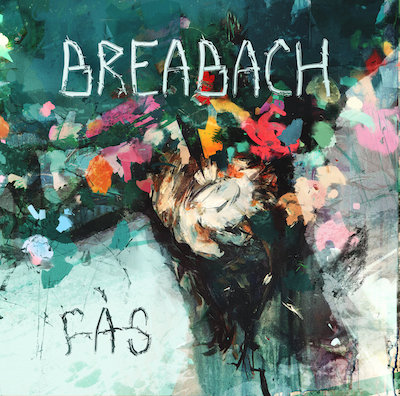
Breabach have always come across as a band never short of ideas, a view reinforced by two of their more recent releases. 2016’s Astar was an album infused with inspiration brought home to Scotland after working with Indigenous musicians in Australia and New Zealand. 2021’s Dùsgadh, a mini album, resulted from a lockdown project with artist Cat Bruce that developed the soundtrack for her animated film of the same name. With Fàs, they’ve returned to more familiar sources of material but still broken fresh ground, adding new instruments and collaborations. The recording features the newest band member Conal McDonagh who has joined fellow highland piper and whistle player Calum MacCrimmon. In addition, Conal brings the unique sound of uilleann pipes into the band, while Calum adds bouzouki to the instrumental mix. The line-up is completed by the fiddles of Megan Henderson, the electric and acoustic guitars of Ewan Robertson and the double bass from James Lindsay. All five members contribute to vocals, though the lead is usually taken by either Megan or Ewan.
Before delving into individual tracks, another aspect of Fàs should be highlighted. Breabach’s passion for the traditional music and culture of their beloved Highlands and Islands has always sat alongside an appreciation of and concern for the natural environment of the region. Fàs reveals they’ve expanded those concerns to embrace the issues currently threatening the natural environment globally. Indeed, these have become a core inspiration for the album. They’ve not merely informed the compositions but have influenced every part of the recording and production processes that created the album.
The three opening tracks have a reassuring air of familiarity for anyone who’s previously listened to Breabach’s music. The first, The Old Collection, is a set of four pipe tunes, three traditional and a fourth composed by Calum. The second, Revolutions, is a song written and sung by Ewan, and the third is Eadàr an Da Bhràigh, a Gaelic song written by a long-time friend of the band, Ewen Henderson and sung by his sister, Megan. The lyrics of both songs relate directly to environmental issues; the revolutions referred to are those of the wind turbines that are destined to play an ever more important role in the battle to slow climate change; Ewan describes it as a love song to a wind turbine. Eadàr an Da Bhràigh celebrates the resurgence of previously threatened woodland habitats in the Creag Meagaidh National Nature Reserve, southwest of the Cairngorms National Park.
Whilst the pipe tunes of The Old Collection may have traditional roots, there are some distinctly modern elements. The first tune, Miss Victoria Ross, opens with a deep bass drone that could plausibly be from the pipes, but undulations in the pitch begin to suggest otherwise. As the set builds to its climax with Calum’s The Clearing, components of the sound undoubtedly have electronic origins. James has brought his Moog to the party. Given the style of his recent solo album, Torus, this is hardly a surprise, but hats off to Breabach for achieving such an effective combination of the traditional and the electronic. Further vital components of the track are the percussive rhythms provided by Inge Thomson, who, guests on percussion and kalimba, contributed some additional programming and, significantly, was the album producer.
Kier Long is the only other guest, adding his analogue synthesizer skills to two tracks, the album’s title track and Dear Green. The title track is a three-part piece interleaving two tunes, one by Calum, and one by Conal, with a traditional waulking song sung by Megan. Dear Green is in two parts, the first, composed by Megan, puts her fiddle playing in the spotlight but only after a section that allows James’ bass a short but very sweet solo. Sleeve notes explain the title comes from “Dear Green Place”, a nickname for Glasgow that, for all the time I’ve spent there, I can’t recall ever hearing it used. But I can confirm that Glasgow seems to have a surprisingly large acreage of green space for a historically industrial city. The second part of the track, Frøvelv, comes from James and honours Svalbard Global Seed Vault in northern Norway, the world’s largest secure storage for seeds. In this last section, Keir’s synthesizer that, so far, has kept a low profile on both tracks, is brought forward in the mix, though never taking the focus away from Calum’s superb whistle.
Calum is also responsible for the final two tracks and takes lead vocal on the closing song. Like many albums released over the last few months, much of the initial work on Fàs took place in isolation during lockdowns. Changing World is an apt title, reflecting the uncertainty that was foremost in many minds during the pandemic, which led many into depression. But the lyrics here explore the contrast Calum could view from his window with nature, in all her various forms, flourishing in our absence.
Fàs is a thoroughly satisfying album that introduces significant new elements to Breabach’s music, but it also confirms they’ve never lost sight of their roots. It brings them very securely back to home ground, all adding up to a fascinating blend of familiarity and innovation. I feel a quote from Calum sums that up nicely.
“We couldn’t be happier with how it turned out – you’ll still know it’s a Breabach album, but it’s definitely a new sound for us.”
Order Fàs: Bandcamp/ProperMusic
